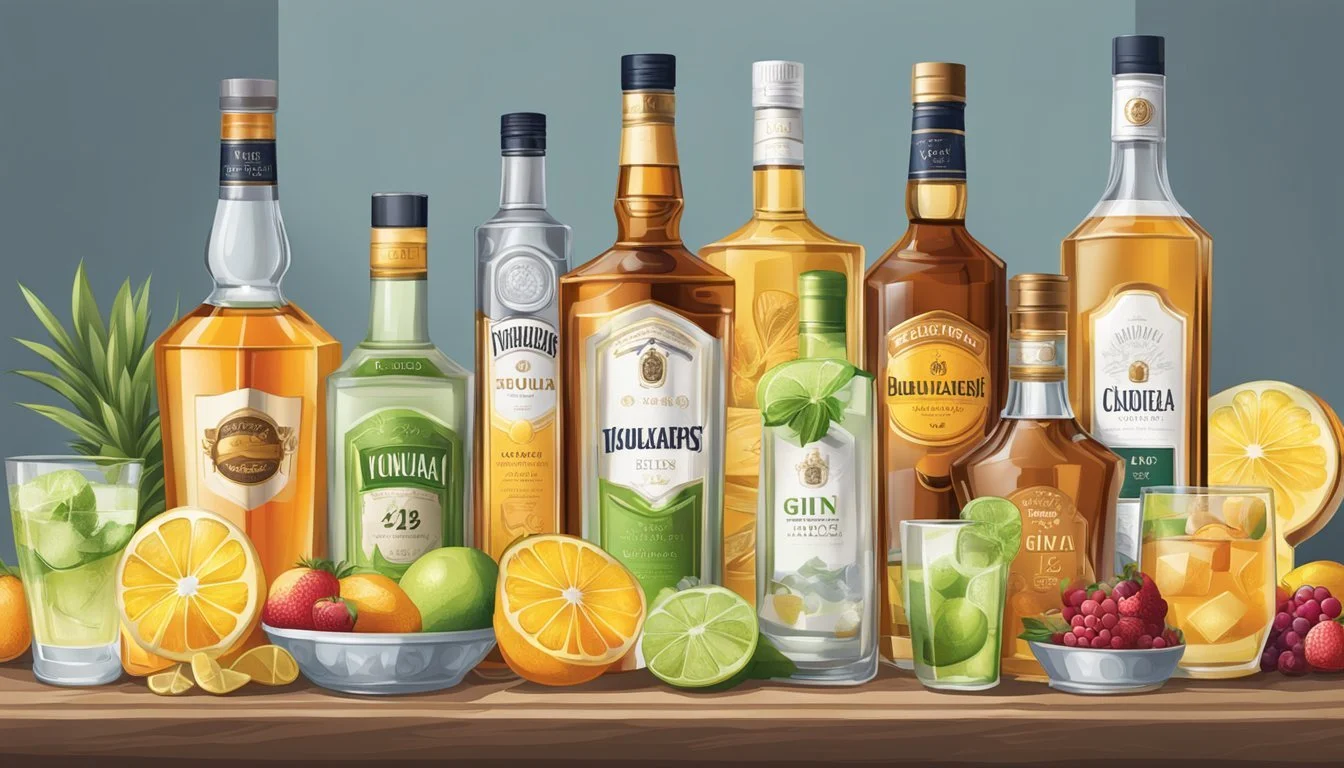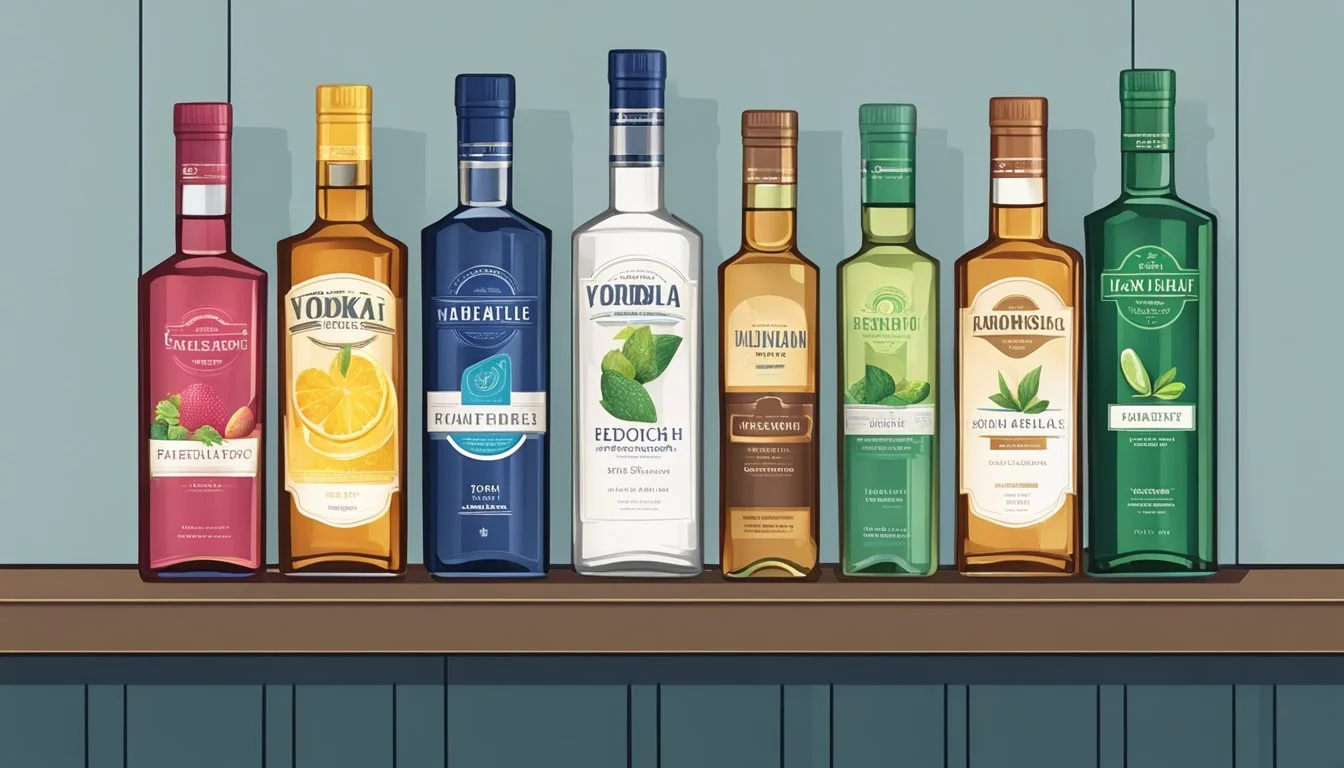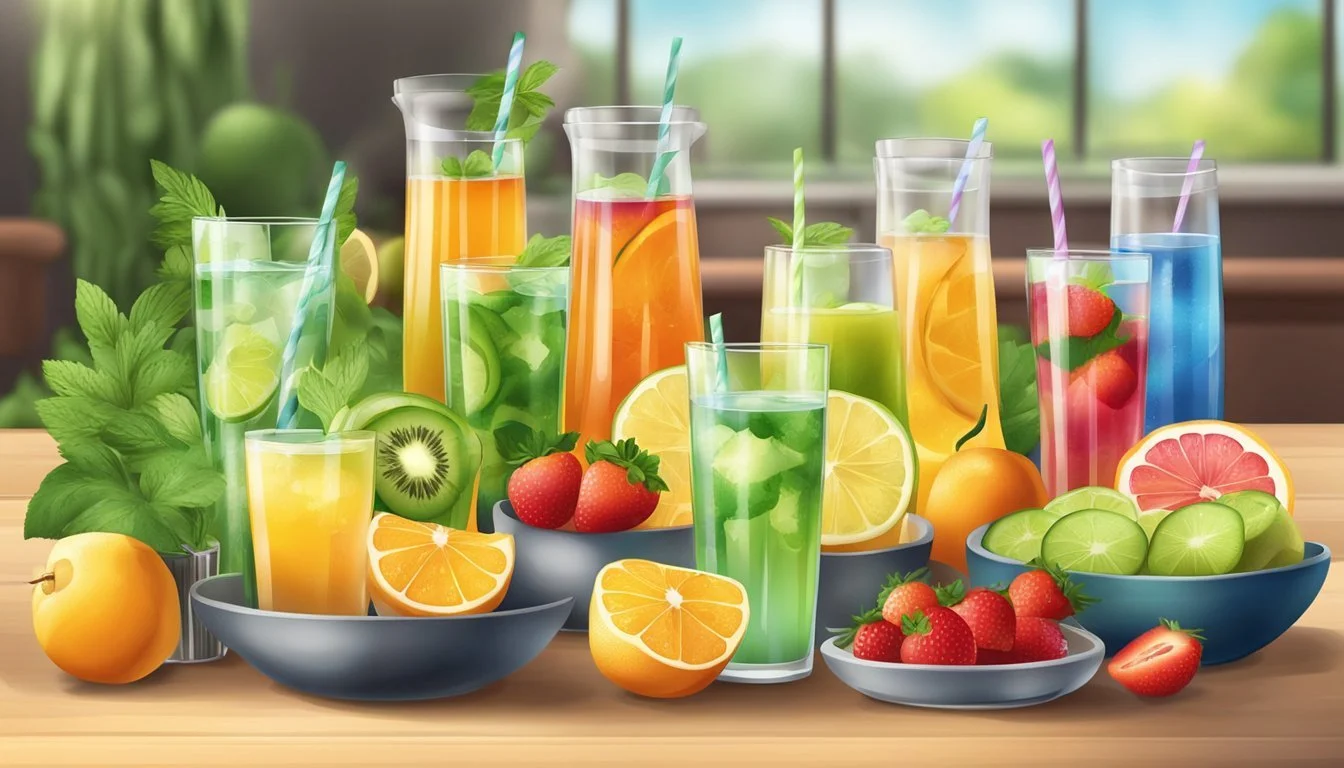Vodka Substitutes
Top Alternatives for Your Cocktails
Selecting a substitute for vodka hinges on the intended use, whether it is for culinary purposes or mixology. In recipes where vodka's clear, relatively neutral taste is essential, gin serves as an effective alternative, imparting a slightly herbaceous undertone due to its juniper berry flavor. Other clear liquors like white rum or tequila can be swapped in at a 1:1 ratio with vodka, providing similar alcoholic potency and maintaining the balance of the dish or cocktail.
For non-alcoholic options, a variety of substitutes exist. Lemonade, with its sweet citrus profile, offers a refreshing twist in mocktails or any beverages where vodka's crisp, clean bite would be typically welcome. Similarly, apple cider and grape juice can stand in during cooking, delivering a fruity depth to the recipe.
When considering non-alcoholic vodka substitutes, one must look for alternatives that mimic vodka's burn and complexity without the alcohol. Certain non-alcoholic spirits have been crafted to replicate the essence of vodka, providing an earthy or vibrant flavor profile suitable for mixed drinks. These specialized substitutes enable everyone to enjoy a broad spectrum of beverages, reinforcing inclusivity in social settings where alcohol is customary.
Understanding Vodka Substitutes
When seeking an alternative to vodka, one must consider the desired flavor profile and the alcohol content of the substitute. The right replacement can be alcoholic or non-alcoholic, depending on the intended use and audience.
Alcoholic Substitutes for Vodka
Gin: Gin serves as a suitable alcoholic substitute for vodka due to its clear appearance and similar alcohol by volume (ABV), although it imparts a distinct juniper berry flavor.
Rum: For a sweeter profile, rum can be used in a 1:1 ratio, keeping in mind its unique taste.
Tequila: Opting for tequila offers a bold and distinctive flavor, suitable for drink recipes that can handle the change.
In Russia and Poland, where vodka is a cultural staple, local spirits might serve as substitutes, though they will alter the taste profile significantly.
Non-Alcoholic Vodka Alternatives
For non-alcoholic alternatives:
White Wine: With an ABV of 10-13%, it's less intoxicating and can complement dishes similarly to vodka.
Lemonade: Offers a citrusy zest in cocktails and mocktails, with its sweetness nicely balancing the absence of vodka.
Regional Variations in Vodka Substitutes
In regions with a strong tradition of vodka consumption, finding an exact non-alcoholic match may be challenging. However, global culinary enthusiasts often utilize:
Witch Hazel: Not commonly known, but used for cocktails due to its astringency.
Apple Cider and Grape Juice: These can be used in culinary applications where a fruity note is desired.
The choice of substitute largely depends on local preferences and the specific qualities of vodka that need to be replicated in the dish or drink.
Alcohol-Based Substitutes
When looking for an alcohol-based substitute for vodka, it is important to consider the desired flavor profile and the strength of the spirit. Vodka is known for its neutral flavor and high alcohol content, making it a versatile ingredient in a variety of cocktails. Here are some specific alcohol-based substitutes.
White Spirits as Substitutes
Gin: This clear spirit is an excellent replacement for vodka due to its similar appearance and alcohol content. Gin will add a botanical flavor, often with notes of juniper and citrus, to the drink. Use gin in a 1:1 ratio for a nuanced twist in vodka-based cocktails.
White Rum: It brings a subtle sweetness to cocktails. White rum is also clear and contains a similar alcohol by volume (ABV) to vodka, making it a suitable swap in many drinks.
Tequila: The agave-based spirit can provide an earthy and slightly sweet flavor. Its use as a substitute should be considered when these undertones can complement the cocktail.
Using Dark Spirits
Whiskey/Bourbon: These spirits offer rich, deep flavors often with woody and vanilla notes. Because of their distinct taste, they're better suited for cocktails where a bolder flavor can be appreciated.
Brandy: A grape-based spirit with fruity nuances. Brandy can replace vodka in cocktails where its warmer, more robust profile will harmonize with other ingredients.
Mezcal: Known for its smoky characteristics, mezcal can be used sparingly as a substitute for vodka to add a distinctive flavor to cocktails.
Liqueurs and Infused Spirits
Liqueurs: These are spirits that have been flavored with fruit, herbs, nuts, spices, or cream and contain added sugar. Given their flavor diversity, matching the profile of the cocktail with an appropriate liqueur can yield a satisfying replacement for vodka.
Schnapps: Often fruit-flavored, schnapps can be a decent alternative in sweet or fruity cocktails, adding a burst of flavor where vodka would have provided a neutral base.
Infused Spirits: Spirits that have been infused with specific flavors like citrus, herbs, or spices can mimic vodka's role while adding subtle taste notes. This approach maintains the spirit's high alcohol content while tailoring the flavor to the cocktail’s needs.
Remember to adjust the quantity of these substitutes based on their flavor strength and how prominent you would like them to be in your final drink.
Non-Alcoholic Substitutes
Exploring non-alcoholic substitutes for vodka allows individuals to enjoy the complexity of their favorite cocktails while abstaining from alcohol. These alternatives cater to a variety of tastes, providing both depth and versatility in flavor profiles suitable for any mixologist's repertoire.
Juices and Sodas
Fresh juices can replace vodka to create a beverage that's both refreshing and full of natural flavor. For example, grape juice offers a depth similar to wine, while apple juice provides a sweet body. Combining orange juice or lemon juice with sparkling water mimics the effervescence of vodka soda. For zest, lime juice adds a tangy kick. Moreover, sodas, such as tonic water or ginger beer, provide an aromatic carbonation that complements the drink's other components.
Flavored Waters
Replacing vodka with flavored waters introduces delicate nuances without overpowering the mix. Lemonade and sparkling water are standout choices for an effervescent and zesty base. Additionally, infused waters with natural essences can subtly enhance the overall flavor palate of a cocktail.
Mocktail Bases
Non-alcoholic spirits, such as Seedlip Spice 94, replicate the herbal and aromatic notes found in vodka. They serve as an excellent foundation for a wide array of mocktails. This particular brand is noted for its blend of allspice, cardamom, and a hint of citrus, lending a crafted depth to drinks that would traditionally call for vodka.
Herbal and Spice Infusions
Crafting mocktails with herbal and spice infusions allows for an intriguing substitute to the traditional vodka kick. Herbs such as coriander or botanicals can be steeped to introduce complexity reminiscent of vodka's versatility. Spices, like vanilla or cinnamon, contribute warming notes that can stand in for the heat typically provided by alcohol.
Cocktail Considerations
Choosing the right substitute for vodka in cocktails requires attention to how it will affect the taste, aroma, and essence of the drink.
Substitutes in Popular Cocktails
When it comes to martinis or bloody marys, gin can be a suitable alternative, imparting a juniper and herbal note. For a Mojito, which traditionally does not include vodka, one could still experiment with white rum to retain the cocktail's signature crispness. A Harvey Wallbanger could use a hint of a sweeter spirit like orange-flavored liqueur to mimic its classic profile when vodka is unavailable.
Cocktail Traditional Spirit Substitute Note on Flavor Change Martini Vodka Gin Herbal and juniper aroma Bloody Mary Vodka Sherry or Gin Savory with sherry, herbal with gin Kamikaze Vodka Tequila A sharper, slightly smoky taste Mimosa (Mocktail) - Sparkling Water Maintains fizz without the alcohol
DIY Cocktail Recipes
Mixologists often embrace the challenge of improvising with available ingredients. Here is a simple recipe that allows for vodka substitutes in a kamikaze cocktail:
1 part gin or tequila
1 part triple sec
1 part lime juice
Ice
Lime wedge for garnish
Shake the spirits and lime juice with ice. Strain into a glass, then garnish with the lime wedge. This replacement will deliver a different yet pleasing flavor profile to the classic kamikaze.
Taste and Aroma Profiles
Substitutes bring their own unique flavor and aroma profiles to the table. For a sweet touch, apple cider or grape juice can add depth to mocktails. For the savory dimension in a dish or drink like a bloody mary, consider sherry. Each should be chosen according to the desired outcome in taste and scent. Here's how to navigate the profiles:
Gin: Herbal, piney, with a hint of citrus
Tequila: Earthy, slightly sweet, with a blue agave aroma
Apple Cider: Sweet, tart, with a fruity undertone
Grape Juice: Sweet, with a grape-like essence
Sherry: Nutty, with a rich and savory profile
Each substitute is meant to complement or boldly enhance the original recipe, providing both home enthusiasts and professional mixologists with creative latitude in cocktail crafting.
Culinary Uses of Vodka Substitutes
When it comes to cooking and baking, vodka substitutes are essential in maintaining the integrity of a dish when alcohol is not an option. They can play a role in enhancing flavor profiles, the texture of batters, and the tenderness of cakes and pies.
Baking and Desserts
In baking, vodka is known for its ability to create flaky pie crusts without imparting a heavy flavor. When vodka is unavailable or undesirable, sparkling water can mimic its moisture-contributing and textural effects. Alternatively, to ensure flavor is not compromised, a combination of lemon extract or vanilla can be used in batters for cakes and desserts to replace the alcohol while still retaining the desired taste and aroma.
Savory Dishes and Marinades
Vodka can enhance the flavors of a marinade or a savory dish. A suitable substitute in a marinade can be white wine, which adds a similar acidic component, or even lemon juice for brightness. For dishes like a premade vodka sauce, a non-alcoholic substitute that maintains the acidic and sharp flavor profile is necessary; white grape juice with a splash of vinegar can be a viable replacement to keep the balance of flavors intact.
Non-Alcoholic Cooking Options
For those seeking non-alcoholic cooking options, substitutes like chicken broth or pasta water can replace vodka in dishes, adjusting the flavor profile by adding acidity with lemon juice or vinegar. This ensures that food retains its intended taste and character without the alcoholic content. Specifically, lemon juice or vinegar helps to replicate vodka's sharpness, making it a practical option for dishes where the subtle bite of vodka is needed.
By understanding and utilizing appropriate substitutes, cooks and bakers can ensure that the absence of vodka does not compromise the quality or flavor of their creations.
Health and Dietary Considerations
When selecting vodka substitutes, one should carefully consider health and dietary implications, including the alcohol content, potential allergens, and adherence to personal dietary restrictions.
Alcohol Content and Nutrition
Vodka generally contains no carbohydrates, proteins, or fats and is low in calories. When one opts for non-alcoholic substitutes, they are often eliminating the alcohol calories from their diet. For instance, substituting vodka with ingredients like lemon juice mixed with water maintains a low-calorie count while emulating vodka's role in recipes.
Allergies and Sensitivities
Individuals with gluten sensitivities may seek vodka substitutes that are explicitly gluten-free, even though most distilled spirits, including vodka, lack gluten. However, there are alternative non-alcoholic options available that guarantee no gluten content and suit those with allergies or intolerances.
Lifestyle and Dietary Restrictions
Certain lifestyles, such as vegetarianism or veganism, and specific dietary restrictions dictate one's choice of vodka substitutes. Health-conscious individuals might prefer non-alcoholic alternatives or other flavoring agents that align with their diet plans, without compromising the quality of the dish. Here are examples of substitutions aligned with dietary preferences:
Gin, white rum, or tequila: For those who do not avoid alcohol but prefer a different spirit.
Broth or pasta water with citrus: For a non-alcoholic option that provides a culinary balance.





